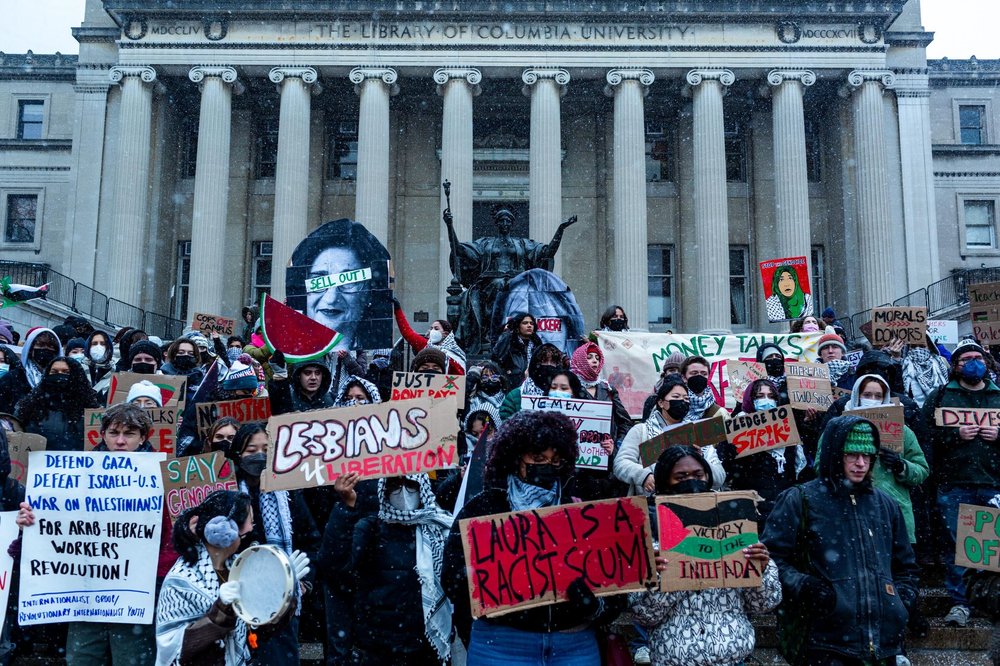NYPD investigating claims that pro-Palestinian protesters at Columbia were hit with 'skunk spray'
Jan. 23, 2024, 8:01 a.m.
Students said the spray caused a nauseating stench that has lasted for days, causing nausea and eye-irritation.

The NYPD and federal authorities are investigating a possible hate crime targeting pro-Palestinian students who were blasted with suspected “skunk spray” while rallying at Columbia University.
The students were part of a coalition of roughly 100 student groups called the Columbia University Apartheid Divest. The group gathered on Friday on campus for the “stop the US war machine” rally calling for an end to U.S. support for Israel’s war in Gaza, among other demands, according to social media posts and Maryam Alwan, a spokesperson for Columbia’s chapter Students for Justice in Palestine.
At around 1:50 p.m., protesters began alerting authorities they’d been hit with what the NYPD believes is “skunk spray,” a non-lethal chemical. Six students submitted complaints with police saying the spray irritated their eyes and made them nauseous, according to NYPD Detective Annette Shelton. The students refused medical attention at the time.
Columbia University wrote in a statement that the school is cooperating with local and federal authorities in an investigation into the incident. In a follow-up statement released Monday evening, Columbia interim provost Dennis Mitchell said the NYPD was taking the "lead role" in an investigation of "what appear to have been serious crimes, possibly hate crimes."
The incident represented a tumultuous start to the spring semester at New York City’s only Ivy League university. The campus has been rocked by frequent protests, anger from prominent donors and outside instigators following the Oct. 7 attack by Hamas militants in Israel and Israel’s ongoing invasion of Gaza.
Alwan, the Students for Justice in Palestine spokesperson, said the spray used at Friday’s protest was not a run of the mill stink bomb. Many students have taken to social media in the days following the rally, posting photos in the hospital due to exposure to the spray.
Students for Justice in Palestine shared images on Instagram of at least four students who entered urgent care or were hospitalized.
“Multiple people have been diagnosed with chemical inhalation and chemical exposure,” Alwan said, adding that symptoms included “lightheadedness, nausea, chest tightness, abnormal heart rate, vomiting.”
The list of students getting sick, according to Alwan, was increasing. Some said they were unable to wash off the smell.
Alwan said the culprits were “counter protestors” attempting to “blend in with protestors.”
Mitchell said in his statement that the "alleged perpetrators" had been banned from campus as the investigation continues. Police said they had made no arrests in connection with the incident.
“Skunk” was invented by an Israeli company and first used by the Israeli military in the West Bank in 2008, according to Reuters. The smell worsens after being washed and can cause prolonged eye-burning and nausea. The spray is now used by U.S. law enforcement, according to a 2015 BBC report, which described the smell as "worse than raw sewage" and "like a mixture of excrement, noxious gas and a decomposing donkey."
In November, Columbia administrators suspended the Students for Justice in Palestine and Jewish Voice for Peace student groups after they “repeatedly violated University policies related to holding campus events.” Many students in those groups participated in Friday’s protest.
A spokesperson at Columbia University said in an email to Gothamist that the protest was unsanctioned and another violation of university policies. The university had not approved of the gathering, the spokesperson said.
Militants killed around 1,200 people during the Oct. 7 attack in Israel. Some 25,000 Palestinians have been killed during Israel’s invasion of Gaza, according to the Health Ministry.
'Everyone is scared': Columbia reels as students feud over Israel-Hamas war